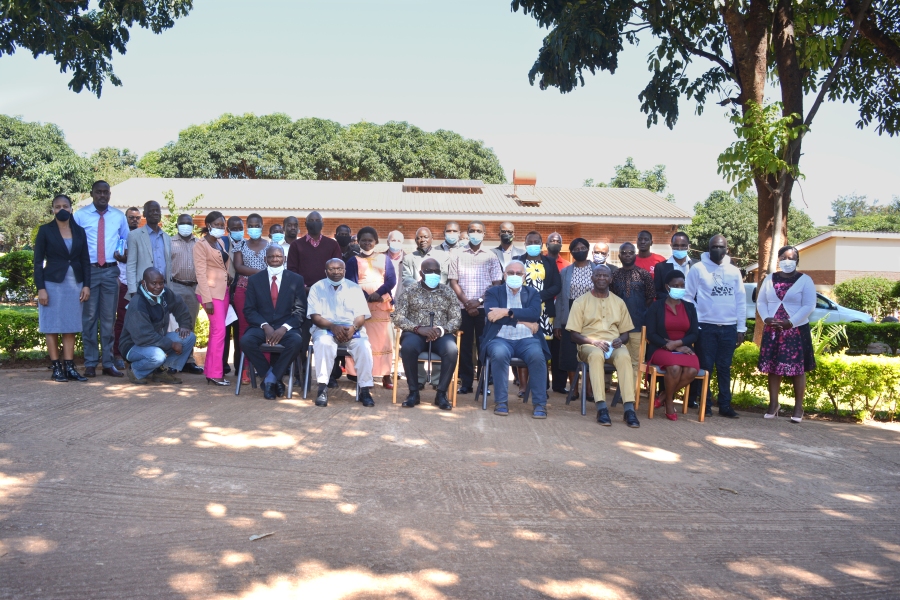Dear Father Founder,
I am very glad to write to you again on a piece of a paper after such a long time. Indeed, by God’s grace and mercy I am still alive and more zealous than ever to commit myself for the service of the African World. It is almost a year now since we went into the lockdown due to the Covid-19 pandemic. If I were to use the words from the letter to His Holiness Pope Francis from our Superior Generals, by then, the outgoing Richard Baawobr and the incoming Stanley Lubungo, it has been for me the time ‘to look at the past with gratitude, to live the present with passion and to look at the future with hope.’ The aim of this letter Dear Father Founder is mainly to greet you. Moreover, I would ask you continue to pray for your beloved societies and their mission in the contemporary African World. I believe that your intercessions may help us to receive God’s blessings and graces to fulfil our duties and responsibilities as “apostles nothing but apostles”.
Dear Father Founder, we ended the year 2020 and entered the year 2021 under the lockdown. There were no gatherings to celebrate and offer thanksgiving masses to the Almighty God to end and welcome a new year. Actually, I found it quite strange and contrary to my experience that, instead of people coming together to give a hand for each other in time of either joy or difficulty, the call now is to isolate in order to protect and help the other to live. Nevertheless, the life during the lockdown has proved that community life plays a big part in the ability to adapt to changing environment and nature of our pastoral activities. Besides, this ability to adapt has a deep root in a prayer life and unity of the community. Undoubtedly, ‘How very good and pleasant it is when kindred live together in unity!’ (Ps. 133:1)
Dear Father Founder, in such a situation whereby coming together increases the risk of the Covid-19 infections, the world has to change its theories and ways things have to be done from the joy and rituals at the beginning of life to the cry and rituals at the end of life. In such an isolating situation one joins the Psalmist cry that “My soul yearns for your salvation; I hope in your word. My eyes yearn to see your promise. I ask, ‘When will you comfort me?’” (119:81-82)
Dear Father Founder, the Covid-19 pandemic caught the world off-guard and has tested greatly our way of life and believing. This automatically touches as well our spirituality. And here we see the important of the invitation from the 2016 Chapter. The Chapter ‘invites us to base our spirituality on the Word and openness to the Spirit so as to live fully the joy of the Gospel with all its challenges’ (pg.19). The life experience during the lockdown made us to re-actualize and contextualize our Missionaries of Africa charism. Based on our core-values, different communities lived our charism in their humble services to God’s people. It can be argued that through personal and community prayer, our spirituality has been sustained more profoundly during this time of pandemic. Even so, community life was very much challenged. Our communities never remained the same from the beginning of the lockdown. At least a member was either self-isolated or stranded out of the community. Consequently, the one or two who remained in the community could find it difficult to recite the psalm 133.
Dear Father Founder, I won’t exhaust you with many things today. I know our deceased confreres who worked or passed through South Africa would love to hear more. I promise to do so next time. However, there is one recent experience which I would not leave it for another time. During this period, we developed our skills in cooking. There was a time we had to cook for ourselves all the meals. Yet, you have to conduct funeral services and to attend to the needs of God’s flock. This is the time I came to understand more your insistence on a community of three confreres.
Dear Father Founder, the pandemic has taught us to be diligent, vigilant, patient, humble and depend totally to God’s Word and providence. It tested our faith, unity, vision and mission. How can one keep the lockdown regulations and teach others to do so yet going out to pasture God’s flock? We have many to talk about next time.
Please, dear Father Founder, send my regards to all confreres who are with you in heaven. Their brothers here on earth are continuing with the mission where they left it. Their prayers are needed. We appreciate their writings. We draw knowledge, skills and joy from them for the Mission.
Your beloved son,
By: Fr. Konrad Simon Millanzi, M.Afr.


